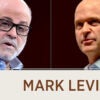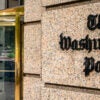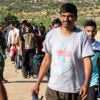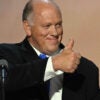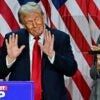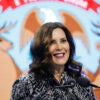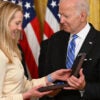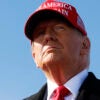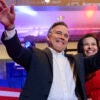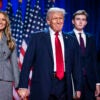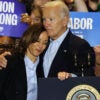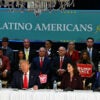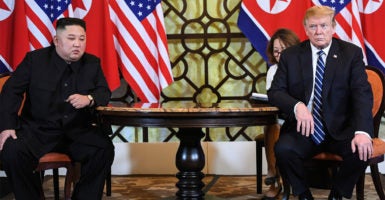Does the slogan “America first” also mean “America alone?”
That was the question asked Friday during the Conservative Political Action Conference, following President Donald Trump’s second summit with North Korean dictator Kim Jong Un.
Among panelists discussing Trump’s “America first” foreign policy were Sen. Joni Ernst, R-Iowa, a member of the Senate Armed Services Committee, and Fred Fleitz, a former CIA analyst who heads the Center for Security Policy.
“It’s a great opportunity on this panel to talk about a question that I have been asked a lot and that is: ‘America first’—does that mean America is alone?” Ernst asked the CPAC audience.
“Absolutely not,” she answered. “It just simply means that America is leading from a position of strength.”
The panel touched on the importance of having strong American leadership globally to promote policy that helps American workers.
“When I think of ‘America first,’ I think we could say ‘Americans first,’ because ‘Americans first’ really represents a backlash against globalists—against the liberal elite—who have put forward foreign policies that leave the American workers, the American citizens, behind,” Fleitz said.
The panel talked about the importance of establishing safety as one policy that benefits both Americans and the nation’s allies.
Part of the conversation centered around the just-ended summit in Hanoi, Vietnam, that aimed for a Trump-Kim agreement to denuclearize North Korea. Negotiations ended without an agreement after North Korea demanded the removal of U.S.-led economic sanctions in exchange for shutting down just one of the North’s nuclear facilities.
“The purpose of the summit was to try to get Kim Jong Un to live up to the commitments he made at the Singapore summit last year,” said Fleitz, who was chief of staff for Trump’s National Security Council for six months last year.
Fleitz praised Trump for walking away from the summit, saying: “If only [then-Secretary of State] John Kerry had done that when he was negotiating that disastrous [nuclear] deal with Iran, we’d be a lot better off today.”
“What we saw in Vietnam was an act of leadership,” Fleitz added. “We know from history that when American officials go to these events, they can’t help but take a deal, even a bad deal. It’s hard to walk.”
Moderator Katie Pavlich, editor of conservative news organization Townhall, asked what the next step might be with North Korea. In response, Ernst stressed the importance of America’s allies:
[North Korea has] other capabilities as well as chemical agents and biological agents. So all across the board, we have to make sure that we are safeguarding our own people, and yes, will that require our allies? Of course, it will. China we typically don’t think of as an ally, but in this case, they are very close to North Korea and we can use them strong-arming the North Koreans a little bit.
The senator from Iowa also agreed that Trump made the right decision in walking away from the terms Kim presented, stressing this would be a “long haul.”
CPAC, the largest annual national gathering of conservative activists, runs through Saturday at the Gaylord National Resort and Convention Center in National Harbor, Maryland, just outside Washington.
